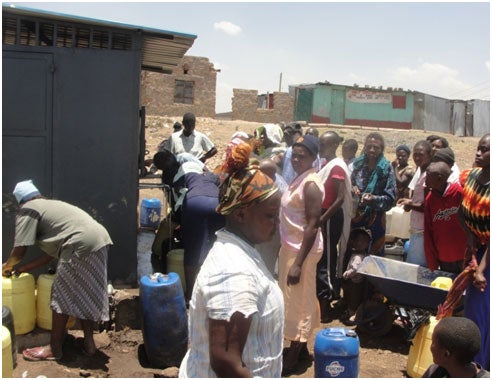 The Ministry of Water and Irrigation (MoWI) in Kenya has been selected as a second place winner of the United Nations Public Service Award (UNPSA) in recognition of its work to promote gender responsive public service delivery with the following motivation:
The Ministry of Water and Irrigation (MoWI) in Kenya has been selected as a second place winner of the United Nations Public Service Award (UNPSA) in recognition of its work to promote gender responsive public service delivery with the following motivation:
”Your institution’s outstanding achievement has demonstrated excellence in serving the public interest and I am confident it has made a significant contribution to the improvement of public administration in your country. Indeed, it will serve as an inspiration and encouragement for others working for public service.”
Only about half of Kenyans have access to safe water and basic sanitation facilities, with the situation worse in rural areas and slums. Women are the most negatively affected due to their traditional responsibility for water collection. Recurrent droughts have required women and girls to go longer distances to find water, forcing them to quit or curtail economic activities, school, and participation in local organizations.
To address these problems, the World Bank and the Water and Sanitation Program (WSP) have collaborated closely with MoWI since 2009 through a series of capacity-building initiatives aiming to strengthen gender integration--and awareness—in the sector.
The US$150 million Water and Sanitation Service Improvement Project (WASSIP), financed by the International Development Association (IDA), and with a financial contribution from the World Bank’s Gender Action Plan, provided gender training to water sector institutions and utilities.
South-South learning exchanges in India, Peru and Colombia accelerated the learning of practitioners and decision-makers on gender-related global best practice. Baseline data on women’s and men’s opportunities and constraints were collected and a community of practice that emerged from that effort has been actively engaged in a policy dialogue to incorporate gender into Kenya’s new water laws, aligning them with the new Constitution. In addition, the partnership between the WASSIP project and the data initiative has influenced World Bank operations at scale. Partnerships have also been leveraged between water sector agencies and with many other partners in the sector.
An innovation in Kenyan administrative has aided these efforts : gender integration in performance-based contracts. The contracts provide incentives and penalties for ministry staff related to their performance on addressing gender inequality. The collective experiences have had several positive results in terms of gender-responsive service delivery, such as:
• Rapid and accelerated increase in women’s access to water by removing the requirement of title deeds as collateral for a water connection, reducing the connection fee, and introducing amortization arrangements for meter repayment
• Gender-disaggregated data produced through a socioeconomic baseline survey for informal settlements to inform infrastructure design; influencing utilities to disaggregate customer complaints to allow tailoring of customer care and services
• Increased participation by women in planning for services, and in accessing paid work in water and sanitation infrastructure development initiatives.
Taken together, the accumulated experiences are expected to continue to transform the sector and promote equality in access to public services. Besides that, the recognition will serve as an inspiration and encouragement for others working for public service in Kenya and elsewhere.
SmartLesson -- Truly Teaming: Partnering to Integrate Gender in Kenya’s Water Sector
In Drought-Stricken Kenya, Improving Water Access Means Empowering Women



Join the Conversation